Module3unit1what job do you do
外研版英语七年级下册Module3 Unit1 教材知识详解

Module3 Unit1 教材知识详解1. What are you going to do at the weekend?你们周末打算做什么?be going to(有方案、有目的〕打算做某事,be going to后跟动词原形,表示“〔有方案、有目的〕打算做某事〞。
be要根据句子主语来确定。
be going to 构造可以和表示将来的时间状语,如tomorrow, next week, next year等连用。
如:She is going to study in Canada next year.她明年要去加拿大学习。
2. check检查;查看,账单check作动词,意为“检查;查看〞。
如:Check your homework before you hand it in.你在交作业之前检查一下。
check还可以做名词,意为“账单〞。
如:May I have the check, please?请把账单给我好吗?3.go over 复习;练习go over为固定短语,意为“复习;练习〞。
如:Go over what we learn today.复习一下我们今天所学的内容。
4. with the housework在家务劳动方面housework作不可数名词,意为“家务劳动〞。
常用短语do housework意为“做家务〞。
如:She does not like to do housework.她不愿意做家务。
5.On Saturday morning, I’m going to check m y email and do my homework.星期六上午我打算查看电子邮件,然后做作业。
on作时间介词时,后接具体的某一天,或者某一天的上午、下午或晚上。
如:On September 9, we have a class party.在九月九日,我们有一个班级聚会。
6. Then I’m going to help with the housework.之后我要帮助做家务。
四年级上册Module 3Unit 1 What are they doing
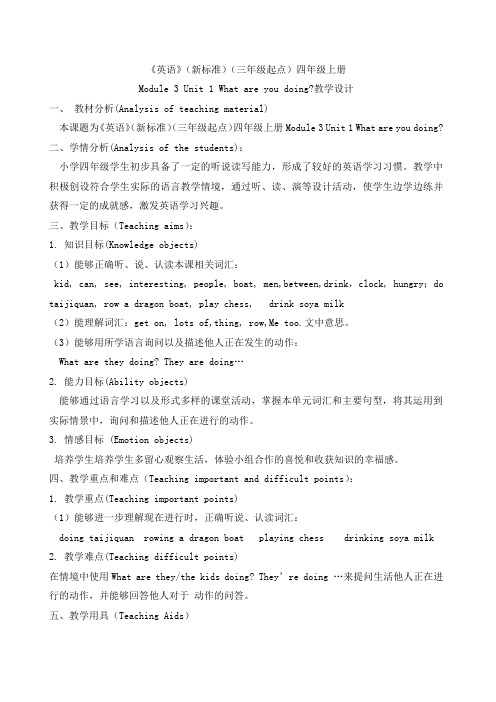
《英语》(新标准)(三年级起点)四年级上册Module 3 Unit 1 What are you doing?教学设计一、教材分析(Analysis of teaching material)本课题为《英语》(新标准)(三年级起点)四年级上册Module 3 Unit 1 What are you doing?二、学情分析(Analysis of the students):小学四年级学生初步具备了一定的听说读写能力,形成了较好的英语学习习惯。
教学中积极创设符合学生实际的语言教学情境,通过听、读、演等设计活动,使学生边学边练并获得一定的成就感,激发英语学习兴趣。
三、教学目标(Teaching aims):1. 知识目标(Knowledge objects)(1)能够正确听、说、认读本课相关词汇:kid, can, see, interesting, people, boat, men,between,drink,clock, hungry;do taijiquan, row a dragon boat, play chess, drink soya milk(2)能理解词汇:get on, lots of,thing, row,Me too.文中意思。
(3)能够用所学语言询问以及描述他人正在发生的动作:What are they doing? They are doing…2. 能力目标(Ability objects)能够通过语言学习以及形式多样的课堂活动,掌握本单元词汇和主要句型,将其运用到实际情景中,询问和描述他人正在进行的动作。
3. 情感目标 (Emotion objects)培养学生培养学生多留心观察生活,体验小组合作的喜悦和收获知识的幸福感。
四、教学重点和难点(Teaching important and difficult points):1. 教学重点(Teaching important points)(1)能够进一步理解现在进行时,正确听说、认读词汇:doing taijiquan rowing a dragon boat playing chess drinking soya milk 2. 教学难点(Teaching difficult points)在情境中使用What are they/the kids doing? They’re doing …来提问生活他人正在进行的动作,并能够回答他人对于动作的问答。
《作业推荐》外研版七年级英语下册 Module3 Unit1课后测试

一、单选题
1.—Tom is going to have ________ picnic.
—Would you like to join ________?
A.a; heB.a; him
C./; himD.a; she
【答案】B
【解析】
【分析】
12.helps with the housework/helps (to) do the housework
13.on Saturday morning
14.go over/review
15. (1).stay(2).alone/by himself
【解析】
【分析】
【11题详解】
句意:吉姆周末踢足球吗?
【答案】A
【解析】
【分析】
【详解】
句意:——在星期天上午你打算做什么?——我还没确定,但是下午我打算做作业。
根据表示具体某一天或某一天的上午、下午、晚上等用介词on,所以在星期天的上午用on;在下午用in the afternoon。故选A。
【点睛】
介词可以用在时间和地点前。放在时间前的用法:at放在几点钟前,例如:at one o’clock;on用于具体的某一天前或者上午、下午、晚上有修饰词时,例如:on Thursday , on cold afternoon; in用于上午、下午、晚上、年、月等。
【24题详解】
句意:考试前他们忙着复习功课。
根据their lessons before the exam可知是go over复习,根据be busy doing sth忙于做某事;故填going。
【25题详解】
句意:今晚我们要去看电影。
module3_unit1_What_are_you_going_to_do_at_the_weekend

一般将来时 用来谈论将来,与表示将来的时间连用;表示将 来发生的动作和存在的状态。 谓语动词构成形式: be going to +动词原形 (表示某人打算/计划做某事) 1.肯定句: 主语+ be going to +动词原形 1) 我打算在早上查看一下电子邮件。 Iam going to check my email in the morning. ______________ 2) 他打算在周末去野餐。 is going to have a picnic He ________________________ at the weekend.
表位移的动词都可以o用现在进行时表“将来 ”,表示按计划或安排不久“将要发生的” 动作。常见的位移动词有: come, go leave Start arrive f#43;位移动词ing+地点 They ____(leave)for Shuiquan this afternoon. 答案:are leaving My mother isn’t here now,She ____later. e B. coming C.has come D.is coming
The language points
1. at/on the weekend: 在周末 有关的名词。星期几,某个特定
on表“时间”,后面常跟与“一天” 节日,某一天的上下午。
Tom often goes fishing____Sunday morning. A. at B.on C.in
2.介词at,in,on表示时间的用法:
alone lonely 区别 alone侧重说明客观情况,强调形体上的“单 独”。 lonely 只做形容词,在句中可做定语,修饰 名词,也可以放在be动词之后作表语。“孤 独的,强调精神上孤单”。 一言辨析 I am alone, but I don’t feel lonely.
看听学第三册【Module3,Unit1(第三册)】

看听学第三册【Module3,Unit1(第三册)】Topic: I get up at half past 6.Grade:Grade 21.教材分析:(1)教学目标:知识技能目标:a. 学习用英语表达自己每天的生活作息时间。
b. 学会本单元短语get up,have peakfast,have lunch,have dinner,go home,go to school,do my homework.(2)情感态度:a.鼓励学生大胆开口说英语,善于用英语跟同学交流。
(3)学习策略:通过学习,培养学生良好的作息时间安排。
(4)教学重点:a.学会本单元短语get up,have peakfast,have lunch,have dinner,go home,go to school,do my homework.(5)教学难点:学习用英语表达自己每天的生活作息时间。
(6)任务设计:让我告诉你。
2.教具准备:钟表,录音机,CD-ROM,贴贴纸。
(2)板书Module3,Unit1I get up/go to bed at ___.I have peakfast/have lunch/have dinner at ____.I go to school/go home at _____.I do my homework at ____.proceduresStep1 warm-up 5`1. GreetingsT:Good morning,class! Ss:Good morning,Miss Huang.T:how are you? Ss:I`m fine,thank you.how are you?1T:I`m fine,too.thank you.2. say the chant.“Dd is for dog.”Step 2.revisionT:show the clock.What`s the time?/what time is it?Ss:It`s… (半点和正点的结合提问)Step3 presentation1.Present the new words.T:can you guess what am I doing?Ss:起床。
新标准三年级上册Module3Unit1教案

新标准三年级上册Module3Unit1教案《英语》(新标准)(三年级起始用)第一册课题: module 3 classroomunit 1 point to the door.《英语》(新标准)(三年级起始用)第一册课题: module 3 classroom unit 1 point to the door.一、teaching aims:(一)knowledge aims1. 能听懂,会说,会读单词:door, window, blackboard, bird, the, please.2.能听懂,会说,会读句型:stand up /sit down/ point to,并口头运用这类语句发指令,同时能根据指令做动作。
(二)ability aims:help the students can understand the orders “stand up /sit down/ point to,”and can do the actions .(三)emotion aims:1.激发学生的英语兴趣。
2.提高学生的自信心和小组合作精神。
二、important points:运用句型“point to...”发出指令。
三、difficult points:1. the correct pronounciations of the words:blackboard/please/bird /the /window/ door.2. 使学生能够透彻理解stand up.sit down.和point to三个指令性短语的意思,并在老师的帮助下灵活运用,指认身边的实物及图片。
四、teaching tools:cai, word cards, tape,cd -rom.,bird model.五、teaching ways: tpr,任务型教学方法学法,循序渐进法,直观教学法,游戏法teaching process:i 、warming up1.t:sing a song 《hello ,hello》first stand up ,please.you did a good job.now sit down,please.( stand up,sit down. 从开学的第一节课就开始训练,大部分学生能理解.)2.free talk:ask the individual student using the sentences that we have learnt “hello,xxx.good morning/afternoon!/how are you?(真实的对话,最能检查学生对所学知识的学习、掌握和运用情况)ii、presentation and practice1.提前将一小鸟的模型放在窗前,教师指着小鸟说today let’s know a new friend.look it’s coming. 教师模仿鸟的声音:hello ,i’m a bird. my name is tweet-tweet.(learn the new word “bird”.)t:say "hello" to tweet-tweet.ss: hello, tweet-tweet.t:hello,boys and girls.(教师扮演小鸟,模仿鸟的语气向孩子们问好,创设真实的语境,激发学生学习兴趣,以及灵活运用语言能力。
新 外研版八上Module 3 Unit 1 练习(有答案)

Module 3 SportUnit1 Nothing is more exciting than playing tennis.练习一、基本词组1. 观看比赛________________2. plentyof__________________3. sit down__________________4. stay at home _______________5. 打网球_________________6. 不要介意________________二、单项选择( )1. I don’t like skiing _______ it’s dangerous.A. becauseB. soC. orD. but( )2. Football is _______ than table tennis.A. difficultB. more difficultC. the more difficultD. the most difficult( )3. We watched the match ______ TV.A. byB. withC. onD. in( )4. Lisa said that she did well in playing ______ tennis.A. aB. anC. theD. /( )5. —____________?—I have a sore throat.A. What are you doingB. What’s the matterC. What do you doD. What’s your job( )6.Eliza never practices hard but she can play the piano as ______ as her sister Rose.A. worseB. betterC. wellD. good( )7. They waited and waited for something _______ to happen.A. exciteB. excitedC. excitingD. to excite( )8.—Let’s buy some cards for our teachers on Teachers’ Day.—Why not make some by hand? It’s much _______.A. interestingB. interestedC. more interestingD. the most interesting( )9. Listening to the ______ music always makes me ______.A. relaxed; relaxingB. relaxed; relaxedC. relaxing; relaxingD. relaxing; relaxed( )10. —Sorry, sir. I made a mistake again.—_______. Practice more and you will do better.A. Never mindB. I’m not sureC. You’re welcomeD. Don’t mention it.( )11. —_______ T-shirt do you like better, the red one or the blue one? —I prefer the red one.A.How muchB. How manyC. WhoseD. Which( )12. Basketball is _______ popular than football.A. moreB. muchC. veryD. quite ( )13. —__________ with you, Mary?—I had a toothache ( 牙疼).A. What’s the wrongB. What’s the matterC. What’s troubleD. What’s matter( )14. _______ is much more exciting than running, I think.A. Play table tennisB. SwimC. Playing volleyballD. Sing and dance( )15. I enjoy ______ on the grassland. Let’s stop _______ and have a rest.A. lying; to walkB. lie; walkingC. lying; walkingD. lie; walk三、用括号中所给的词的正确形式填空1. I don’t like this movie because it’s _______ ( bore ).2. What an _______ ( excite ) basketball match it is!3. We felt _______ (excite ) when we listened to the music.4. Looking after a baby is a kind of _______ ( tire ) job.5. ________ ( stay ) at home is more boring than going to the cinema.6. Do you enjoy _______ ( swim ) ?四、写出下列形容词的比较级popular___________ difficult ___________cheap ____________ dangerous _________expensive _________ easy ______________busy _____________ tiring ______________safe _____________ exciting ___________五、补全对话A: Do you like ball games?B: ________.A: What ball do you like best, football, basketball or pingpong?B: ________.A: I think I like football best.B: ________. But I like basketball better than football.A: ________.B: Yes. Most of the boys in our class are good at it.A: ________.B: Sorry, I’m afraid not. We’ll have a class meeting this afternoon.Module 3 Array SportUnit1 Nothing is more excitingthan playingtennis.练习答案一、基本词组1. watch a match2.许多;大量3. 坐下4. 呆在家里5. play tennis6. Never mind二、单项选择1-5 ABCDB 6-10 CCCDA 11-15 DABCC三、用括号中所给的词的正确形式填空1. boring2. exciting3. excited4. tiring5. Staying6. swimming四、写出下列形容词的比较级more popular more difficult cheaper more dangerous more expensive easier busier more tiring safer more exciting五、补全对话1-5 CDABEⅠ. 用所给词的适当形式填空(10分)1. Do you know the__________(mean)of the new word?2. We are so tired. Let’s stop__________(have)a rest.3. Do you know how I can improve my__________(speak)?4. __________(write)is very important in learning English.5. I made__________(friend)with the visitors from Korea. 【:】Ⅱ. 单项选择(10分)1. What do you think about______English films?A. watchB. to watchC. watchedD. watching2. Australia is a(n)______country.A. speaking-EnglishB. English-spokenC. English-speakingD. English speaking3. Sorry, I______to tell you about my last school trip. 【】A. forgottenB. rememberC. rememberedD. forgot4.—Would you like______tennis with us?—I’d love to. I like______tennis very much.A. playing; to playB. playing; playingC. to play; playingD. to play; play5. We’ll invite our good friend Han Mei______our Engl ish party.A. toB. forC. inD. atⅢ. 完成句子(10分)1. 韩梅一直和家人住在北京。
四年级上册英语教案-Module 3 Unit 1 What are they doing (4)
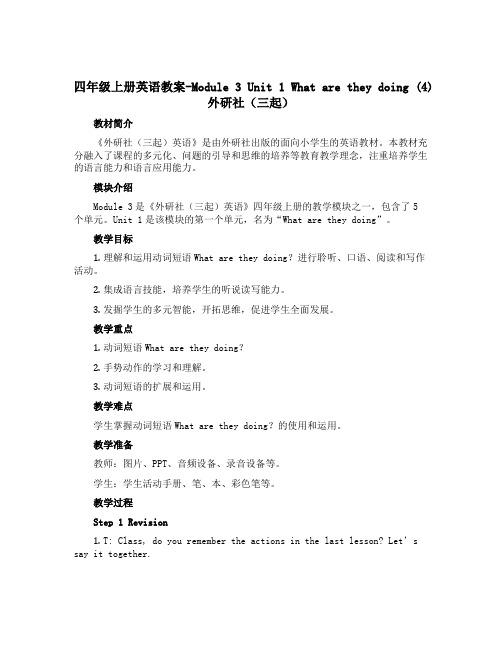
四年级上册英语教案-Module 3 Unit 1 What are they doing (4)外研社(三起)教材简介《外研社(三起)英语》是由外研社出版的面向小学生的英语教材。
本教材充分融入了课程的多元化、问题的引导和思维的培养等教育教学理念,注重培养学生的语言能力和语言应用能力。
模块介绍Module 3是《外研社(三起)英语》四年级上册的教学模块之一,包含了5个单元。
Unit 1是该模块的第一个单元,名为“What are they doing”。
教学目标1.理解和运用动词短语What are they doing?进行聆听、口语、阅读和写作活动。
2.集成语言技能,培养学生的听说读写能力。
3.发掘学生的多元智能,开拓思维,促进学生全面发展。
教学重点1.动词短语What are they doing?2.手势动作的学习和理解。
3.动词短语的扩展和运用。
教学难点学生掌握动词短语What are they doing?的使用和运用。
教学准备教师:图片、PPT、音频设备、录音设备等。
学生:学生活动手册、笔、本、彩色笔等。
教学过程Step 1 Revision1.T: Class, do you remember the actions in the last lesson? Let’s say it together.Ss: Sure. Playing football, running, swimming, dancing, singing and jumping.2.T: Great, I am happy to see you remember it.Step 2 Presentation1.T: What are they doing now? (Show a picture of people doing different actions) Can you guess?Ss: …2.T: Let’s chant. (Teach the chant)What are they doing? (Pointing to each picture)What are they doing?Let’s find out. (Point to our ears and mouth)3.Play the audio to help the students understand and chant.Step 3 Practice1.T: Can you do it with me? (Gesture to each picture and the students will say What are they doing?).2.Students practice with their partners.3.T: Ok, now let’s change. You do the gesture and let your partner guess.4.Students practice with their partners.Step 4 Consolidation1.T: Let’s write one sentence for each picture.2.Ss: (Write the sentence)3.T: Let’s check the answers.Step 5 Extension1.T: Can you add more actions to the chant? Think about it.Ss: (Think about it)2.T: Show me your answers.Ss: (Raise their hands and share their answers)T: Excellent.Step 6 Assessment1.T: Let’s make a dialogue. (Show a picture of two people doing the actions.)2.T: Who can be the person A and who can be the person B?3.Ss: (Volunteer to play the roles)4.T: Ok, let’s start.Step 7 Homework1.T: Please write a short paragraph about what you like to do at home.Step 8 Summary1.T: In this class, we learned。
新 外研七下练习Module 3 Unit 1 基础练习题 (含答案)

外研版英语七年级下册Module 3 Unit 1 基础练习题一、汉译英1. 在星期六早晨________2. 做家务________3. 下个星期________4. 在2008年________5. 在周末________6. 上钢琴课________7. 看电影________8. 卧床________9. 野餐________10. 听音乐________11. 聚会________12. 查看邮件________二、选词(词组)填空2. The students are going to ________ next week.3. Ella has a good ________ about his summer holiday.4. I'm going to make a ________ for my study next year.5. I'm so busy that I have no time to ________ my grandparents at the station.6. Betty is going to ________ home and watch TV alone .三、用am/is/are going to do填空1. —Who ________ (have) a piano lesson on the weekend?2. My mother and I ________(do) some shopping next Sunday.3. —What ________ you ________(do) tomorrow?—I ________(clean) my car.4.—When_______the secretary _______(print) the document?—She ________(print) it soon.5. My son's hair is too long. He ________(have) a haircut at the weekend.6. There ________(be) two football matches on our playground.四、补全句子1. The little girl ________ ________ ________(上钢琴课) every Saturday.2. Sam is going to ________ ________ ________(查看邮件).3. Don't ________ ________ ________(卧床) too long. You can go out for a walk.4. Peter is going to ________ ________ ______ (听音乐) with his brother.5. We usually have a ________(聚会) on New Year's Day.6.stay at alone7.have a picnic8.on the weekend9.be foolish 10. fantastic6. I’m going to ________ ________ home ________(独自待在家).7. Lingling and Daming are going to ________ ________ ________(野餐).8. What are you going to do ________ ________ ________ (在周末).9. Don’t ________ ________(别傻了),come with us please!10.It’s going to be a ________(极好) weekend五、完形填空Many people think that Americans 1 their cars almost more than anything else. When 2__ people are fourteen years old, they want to have their __3_ cars. They don’t ask for a car from their 4__. So many of them work in _5_ time during their last year of high school to buy a car. Learning to 6 _ and getting a driver’s license may be one of the most exciting things in a young person’s life. Some people almost 7 _ go to a doctor when they are ill. But they will __8_ their cars to a garage as soon as they think there is a 9 . On Saturdays or Sundays some people may 10 most of their time washing and repairing their cars.1. A. prefer B. loveC. drive D. play2. A. little B. big C. old D. young3. A. new B. own C. expensive D. cheap4. A, friends B. teachers C. parents D. brothers5. A. free B. busy C. study D. good6. A. make B. mend C. wash D. drive7. A. always B. never C. often D. usually8. A. take B. carry C. pull D. lift9. A. question B. wrong C. mistake D. problem10. A. cost B. get C. spend D. use六、阅读理解“Tell me what you are going to do on Sunday morning, Mike,” asks Mr Wang.“I'm going to see a new film. It's an English film about the life of the students in America. Bill tells me it's very interesting.”“After seeing the film,what are you going to do?” Mr Wang wants to know. “I'm going to read Chinese,” says Mike. “Do you like it?” asks Mr Wang. “Chinese is not easy for me,but I like it very much. I'm going to work hard at it. After lunch I'm going to do my homework. I think I can do it better tha n before.” “Then,what about Sunday evening?” Mr Wang asks. “After supper I'm going to help Han Mei with her English. She wants my help.” says Mike.“You are going to have a busy day,aren't you?” says Mr Wang.根据短文内容,判断正(T)误(F)。
外研版八年级上册英语Module3Unit1
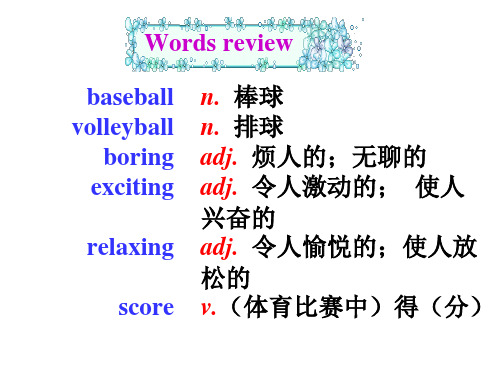
ecxhpeeanpseivre than buying tickets for the games.
√ 5 Going to the stadium was more difficult
than staying at home.
more dangerous
difficult
more difficult
…is more …/ …er than ….
popular exciting relaxing enjoyable interesting expensive cheap safe easy
running
swimming
basketball
boring interesting expensive cheap safe easy tiring
running basketball tennis
swimming
table tennis football What do you think of
volleyball …?
I
baseball think it’s
累人的 / 放松的
I think swimming is tiring.
dangerous / safe
危险的 / 安全的
I think boating is dangerous.
Talk about the sports in pairs. difficult dangerous popular exciting relaxing enjoyable
B: Volleyball and tennis. Tennis is fun. D: I like table tennis. It’s a faster game than tennis. B: I’ll play table tennis with you.
外研小学英语(三起)六年级上册Module3Unit1课文及翻译
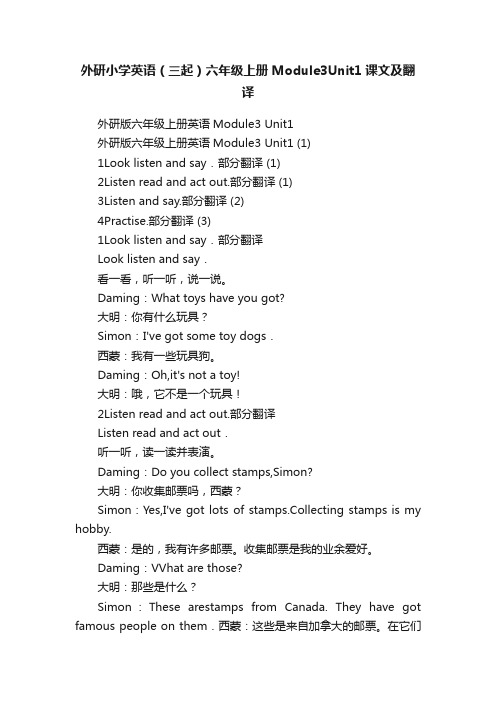
外研小学英语(三起)六年级上册Module3Unit1课文及翻译外研版六年级上册英语Module3 Unit1外研版六年级上册英语Module3 Unit1 (1)1Look listen and say.部分翻译 (1)2Listen read and act out.部分翻译 (1)3Listen and say.部分翻译 (2)4Practise.部分翻译 (3)1Look listen and say.部分翻译Look listen and say.看一看,听一听,说一说。
Daming:What toys have you got?大明:你有什么玩具?Simon:I've got some toy dogs.西蒙:我有一些玩具狗。
Daming:Oh,it's not a toy!大明:哦,它不是一个玩具!2Listen read and act out.部分翻译Listen read and act out.听一听,读一读并表演。
Daming:Do you collect stamps,Simon?大明:你收集邮票吗,西蒙?Simon:Yes,I've got lots of stamps.Collecting stamps is my hobby.西蒙:是的,我有许多邮票。
收集邮票是我的业余爱好。
Daming:VVhat are those?大明:那些是什么?Simon:These arestamps from Canada. They have got famous people on them.西蒙:这些是来自加拿大的邮票。
在它们上面有名人。
Daming:Ha've you got any stamps fromChina?大明:你有来自中国的邮票吗?Simon:Yes,I have. This stamp is from China. And all of these stamps are from China too.西蒙:是的.我有。
外研版英语八年级下册Module3unit1笔记

外研版英语⼋年级下册Module3unit1笔记Module 3 Journey to spaceUnit 1 Has it arrived yet?⼀、.短语1.你在忙什么?What are you up to be up to...(名词、代词或-ing形式) 忙于、正在做....2.最新消息the latest news3.上新闻:on the news (介词短语)4.去过⽉球have been to the moon5.远离、遥远:be far ( away )1) sw. be far ( away ) from sw 某地离某地远2) sw be 数词kilometer(s)/ meter(s) (away ) from sw 某地离某地有多远=It is 数词kilometer(s)/ meter(s) (away ) from sw to sw.My home is 10 kilometers from the school .=It is 10 kilometers from my home to the school.6.为了做某事in order to do sth. (放句⾸或句中)7. 上⽹: go online8..搜索信息search for information 9. 获取有关....信息:get information on...⼀、1. What are you up to?你在⼲什么呢?2.Do you want to stay or go? It’s up to you. 你要留还是要⾛?你⾃⼰定。
3.You don’t look well.What’s up?你看起来不好。
怎么了?1)be up to... 后接名词、代词或-ing形式⽤来表⽰“正在做什么事、忙于某事”2)be up to sb 由……决定3)What’s up意为怎么了?相当于:What’s wrong / What’s the matter?⼆、Have you heard the latest news? 你听说最新的消息了吗?/doc/4d9566babbd528ea81c758f5f61fb7360a4c2b4c.html test 1). adj. 最新的;最近的2). adj. 最迟的;adv. 最迟地1)你看了最新的报纸了吗?Have you read thelatest newspaper?2)今早他是最迟到校的。
Module3 Unit1 教材知识详解
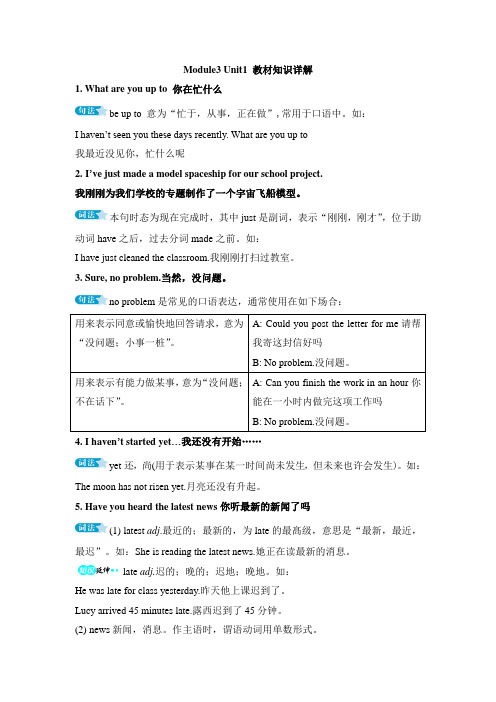
Module3 Unit1 教材知识详解1. What are you up to 你在忙什么be up to 意为“忙于,从事,正在做”,常用于口语中。
如:I haven’t seen you these days recently. What are you up to我最近没见你,忙什么呢2.I’ve just made a model spaceship for our school project.我刚刚为我们学校的专题制作了一个宇宙飞船模型。
本句时态为现在完成时,其中just是副词,表示“刚刚,刚才”,位于助动词have之后,过去分词made之前。
如:I have just cleaned the classroom.我刚刚打扫过教室。
3. Sure, no problem.当然,没问题。
no problem是常见的口语表达,通常使用在如下场合:用来表示同意或愉快地回答请求,意为“没问题;小事一桩”。
A: Could you post the letter for me请帮我寄这封信好吗B: No problem.没问题。
用来表示有能力做某事,意为“没问题;不在话下”。
A: Can you finish the work in an hour你能在一小时内做完这项工作吗B: No problem.没问题。
4. I haven’t started yet…我还没有开始……yet还,尚(用于表示某事在某一时间尚未发生,但未来也许会发生)。
如:The moon has not risen yet.月亮还没有升起。
5. Have you heard the latest news你听最新的新闻了吗(1) latest adj.最近的;最新的,为late的最髙级,意思是“最新,最近,最迟”。
如:She is reading the latest news.她正在读最新的消息。
late adj.迟的;晚的;迟地;晚地。
外研版(三起)英语五年级上册Module3Unit1Wheredidyougo练习卷

外研版(三起)英语五年级上册Module 3 Unit 1 Where didyou go 练习卷学校:___________姓名:___________班级:___________考号:___________一、词形转换1.visit (过去式) ________2.place (复数) _________3.lots of (同义词组) _________4.take (过去式) _________5.our (同音词) _________6.minute (复数) __________7.like (过去式) __________8.ride (现在分词) __________二、单选题9.What did you do ______the weekend? ()A.at B.in C.to10.We ______ to the London Eye. ()A.didn’t went B.goes C.went11.—_______ did you go there? ()—I went by bike.A.What B.Where C.How12.I didn't take ___ photos. ()A.manyB.anyC.much13.We didn’t _______ the night sky yesterday. ()A.saw B.seeing C.see14.We visited ______places. ()15.Where did you go _______ Sunday? ()A.on B.in C.last 16.We went to _________ British Museum and _________ Big Ben. () A.the; /B.a; the C.the; the 17.We ________ you a postcard last Saturday.()A.sentB.sendsC.send18.She liked the bus _____ best.()A.rideB.ridesC.riding三、连词成句19.you, museum, like, do, the (?)______________________________20.along, took, the, river, we, trip, boat, a (.)______________________________21.day, had, we, good, a (.)______________________________22.places, we, visited, of, lots (.)______________________________23.do, did, what, weekend, at, you, the (?)______________________________24.go, where, you, last, week, did (?)______________________________25.do, did, what, yesterday, you (?)______________________________26.can, we, there, get, how (.)______________________________27.four, hours, took, it, get, to, there (.)______________________________28.why, you, like, do, best, it (?)______________________________四、句子匹配29.How are you? ( )30.What did you do at the weekend? ( ) 31.How did you go to these places? ( ) 32.Did Lingling like it? ( )33.Where did you go yesterday? ( )五、找出错误部分并改正34.改错:I have a good day yesterday.__________35.改错:Did she likes the museum?_______________________________36.改错:Where did you do last weekend?_______________________________37.改错:She likes the bus ride better._______________________________38.改错:It take us two hours to get there yesterday. _______________________________39.改错:How did you got to there?_______________________________40.改错:What did you do on the weekend?_______________________________41.改错:Where did you go at last Sunday?_______________________________六、阅读判断It’s a fine Sunday morning. There are many people here. They are looking at Big Ben. Many of them are young and some are old. Two boys are playing football. A girl is flying a kite. There is a lake here. Mary and I are drawing near the lake. I am drawing Big Ben. I want to give the picture to my mother as a gift.42.It is a fine Saturday morning. ( )43.Two boys are playing with a doll. ( )44.A girl is eating a banana. ( )45.I am drawing a picture of Big Ben. ( )46.The people are looking at Big Ben. ( )参考答案:1.visited2.places3.a lot of4.took5.hour6.minutes7.liked8.riding【解析】1.visit参观,过去式是加ed,故答案为visited。
牛津英语6B Module3 My neighbourhood

Oxford English 6BModule 3 My neighbourhood Unit 1 What job do you ant to do?一词汇1.bank n. 银行2.businessman n. 商人3.businesswoman n. 女商人4.clerk n. 职员,店员5.finish v. 完成6.if conj. 如果7.interview v. 采访,访问8.project n. 工程,项目9.secretary n. 秘书10.would (will的过去式)二短语1.want to do 想要做….三语法1.特殊疑问句:What job do you do?What time do you start / finish work?2.would like to do 想要做….. (委婉礼貌,交际用语)四日常生活用语1.Would you like to do?2.I’d like to do.Unit 2 Please visit our school!一词汇1.board n.木板2.choirn. 唱诗班3.club n.俱乐部4.covered adj. 被覆盖的5.entrance n.入口rmation n.信息7.invite v.邀请8.parent n. 父亲或母亲9.programme n.规划,节目10.staff n.全体职员二短语1.Open Day开放日三语法1.一般将来时(will)2.一般过去时3.顺序:First, Next, Then, After that…. , Finally4.at + 时刻Unit 3 One the way一词汇1. almost adv. 几乎,差不多2. church n. 教堂3. hawker n. 小贩4. take v. 花费(时间)5. travel v. 旅行6. underground n.地铁二语法1.一般现在时2.特殊疑问句: How do you go to school?How long does it take?3. It takes (sb )time to do 做某事花费(某人)时间4. when 引导时间状语从句,“当…时候”Unit 4 Rules around us一词汇1. enter v. 进入2. mean v. 意思是3. speak v. 讲话4. tidy adj. 整齐的二短语1.make one’s bed 整理床铺,铺床2.put up one’s hand 举手3.switch off (用开关)关闭4.keep quiet 保持安静三语法1.情态动词must2.祈使句;以动词原型开头的句子,可由please修饰,放句前后皆可,否定祈使句用don’t 。
Module3Unit1Whatareyougoingtodoattheweekend教案
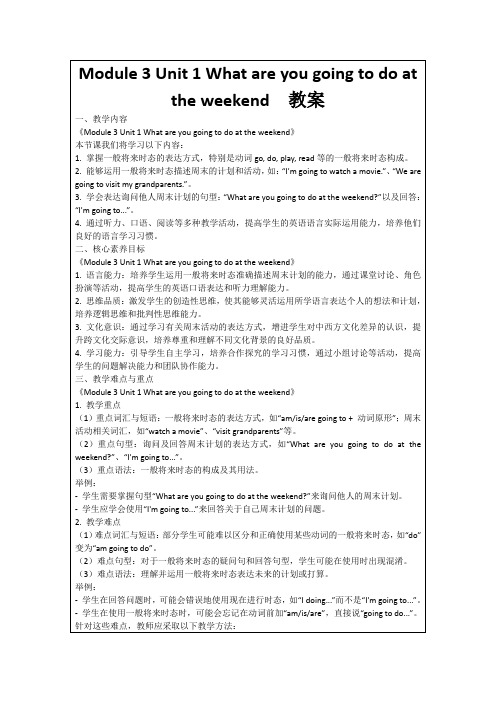
1.理论介绍:首先,我们要了解一般将来时态的基本概念。一般将来时态是用来描述未来将要发生的事情或计划。它是英语中非常重要的时态之一,因为它帮助我们谈论未来的计划和预期。
2.案例分析:接下来,我们来看一个具体的案例。这个案例展示了如何用一般将来时态描述周末计划,以及它如何帮助我们与他人交流。
-学生应学会使用“I'm going to...”来回答关于自己周末计划的问题。
2.教学难点
(1)难点词汇与短语:部分学生可能难以区分和正确使用某些动词的一般将来时态,如“do”变为“am going to do”。
(2)难点句型:对于一般将来时态的疑问句和回答句型,学生可能在使用时出现混淆。
(3)难点语法:理解并运用一般将来时态表达未来的计划或打算。
4.通过听力、口语、阅读等多种教学活动,提高学生的英语语言实际运用能力,培养他们良好的语言学习习惯。
二、核心素养目标
《Module 3 Unit 1 What are you going to do at the weekend》
1.语言能力:培养学生运用一般将来时态准确描述周末计划的能力,通过课堂讨论、角色扮演等活动,提高学生的英语口语表达和听力理解能力。
此外,我还注意到在课堂总结时,部分学生对于一般将来时态的应用仍然存在疑问。为了帮助他们更好地消化和理解这些知识点,我决定在课后提供一些额外的学习资源,如在线练习和视频讲解,以供他们自主学习。
举例:
-学生在回答问题时,可能会错误地使用现在进行时态,如“I doing...”而不是“I'm going to...”。
-学生在使用一般将来时态时,可能会忘记在动词前加“am/is/are”,直接说“going to do...”。
七年级英语下册Module3Unit1Whatareyougoingtodoatthe

have a picnic 去野餐
help with the 帮忙ho做u家se务work
see a movie 看电影
check one's 查阅邮件 email
do one's homework
做家庭作业
have a piano lesson 上钢琴课
Stay at 待在家 home
重点词汇:
1. go over lessons 复习功课 2. have a picnic 去野餐 3. help with the housework 帮忙做家务 4. see a movie 看电影 5. check one's email 查阅邮件 6. do one's homework 做家庭作业 7. have a piano lesson 上钢琴课 8. stay at home 待在家
____S_h_e_i_s_n_'t_g_o_in_g__to__d_o_h_e_r__h_o_m_e_w_o_r_k_(她打算不做她的家庭作业) 一般疑问句: be(am / is /are )+主语 + going to + 动词原形+其他 ?
肯定回答:Yes ,主语+ be 否定回答:No , 主语+be + not
•Thank you !
help with the housework 帮忙做家务
---What is she going to do on saturday morning ---She is going to help with the housework.
see a movie 看电影
- 1、下载文档前请自行甄别文档内容的完整性,平台不提供额外的编辑、内容补充、找答案等附加服务。
- 2、"仅部分预览"的文档,不可在线预览部分如存在完整性等问题,可反馈申请退款(可完整预览的文档不适用该条件!)。
- 3、如文档侵犯您的权益,请联系客服反馈,我们会尽快为您处理(人工客服工作时间:9:00-18:30)。
My neighbourhood
Unit 1
What job do you want to do?
Guess
Brainstorm
policeman/policew omen
engineer
postman
chemistry
JOBS
spy killer
lorry driver
milkman
+
a fisherman
+
+
+
+
+
a teacher
a secretary
a nurse
Write a report, like this:
a pilot
an astronaut
a doctor/ dentist
a cook
a waiter/ waitres s
a policeman/ policewom an
What job does he do?
What does a farmer usually do?
Look and learn
2-1
Would you like to be a policeman? Why?
Yes, I would.
I’d like to be a policeman because I want to make our city a safe place.
1 2
2-2 Would you like to be a cook? Why ? No, I wouldn’t. I wouldn’t like to be a cook because I don’t like cooking. I’d like to be a driver.
1 2
Gold Mine
A policeman, a.k.a a police officer works in partnership with the public and are in the front line in the fight against crime and the fear of crime.Police officers are citizen-focused, responding to the needs of individuals and communities. Using the latest technology, police officers are trained to manage information and intelligence in order to secure successful court prosecutions.
Option 1
Play a game
Play a game
S1: S2: S1: S2:
Would you like to be a/an _____? Yes, I would. Why? I’d like to be a/an _____ because I don’t want to…
S1: S2: S1: S2:
Do a survey
a pilot
+
a an astronaut doctor/denti a cook + st +
a policeman/ + a farmer policewoman a postman
+
+ a driver
+
a waiter/ + waitress a fireman
+
+
a shop assistant a factory worker
Three students would like to be pilots.
a farmer a driver
Two students would like to be policemen.
One student would like to be a secretary.
a a postman fireman
பைடு நூலகம்
deliver: to take (goods, letters, parcels, etc.) to people's houses or places of work.send: to cause sth. to go from one place to another, esp. by postdispatch: to send (esp. goods or a message) somewhere for a particular purpose.从上面词的解释来看, deliver主要是表示投递(商品,信件,包裹 等)做deliver这个事的人是邮差或者送货人, 例如邮差将信投放到我的油箱中,就用 deliver;The shop is delivering our new bed on Thursday.而send表示寄的时候,主语可 以是寄的人(这个可以从解释中的cause看 出),如我寄了封信,就用send,i send a letter to him.而dispatch是送的一种,带有某 种特殊用途,send用的更广泛:例如:to dispatch food and clothing to refugee.
a dentist
a cook
a shop assistant
a pilot
a doctor
a postman
a policeman/ a policewoman
a taxi driver
a teacher
Listen and circle
Circle the jobs the students would like to do.
makes sick people better flies a plane sells things to people
A factory worker A fireman
A bank clerk A businessman/ businesswoman
makes things in a factory puts out fires receives money and gives money in a bank
Family Job? Like or not? Why?
Do a survey
Father
Mother Father Mother Father Mother
Y
Y Y Y Y Y
N
N N N N N
Father
Mother
Y
Y
N
N
a bank clerk is an employee of a bank. Every transaction—from cashing a check to taking out a loan—requires careful record keeping. Behind the scenes in every bank or savings and loan association there are dozens of bank clerks, each an expert at keeping one area of the bank's business running smoothly. Nurses work in a large variety of specialties where they work independently and as part of a team to assess, plan, implement and evaluate care. Nursing Science is a field of knowledge based on the contributions of nursing scientists through peer-reviewed scholarly journals and evidenced-based practice. A reporter is a person employed by a newspaper, magazine, or television company to gather and report news. A waiter takes orders and serves food and beverages to cutomers at tables in dining places.
A nurse A doctor A pilot A shop assistant
cooks food for people takes notes and answers phones looks after people’s teeth helps make sick people better
Would you like to be a/an _____? No, I wouldn’t. Why? I wouldn’t like to be a/an _____ because I …
Treasure Box
Option 1
Do a survey
+ Work in groups and find out what your classmates would like to be.
nurse doctor dentist
Look and learn
a secretary a bank clerk a policewoman
a dentist
a pilot
a fireman
a postman
a shop assistant
Look and identify
